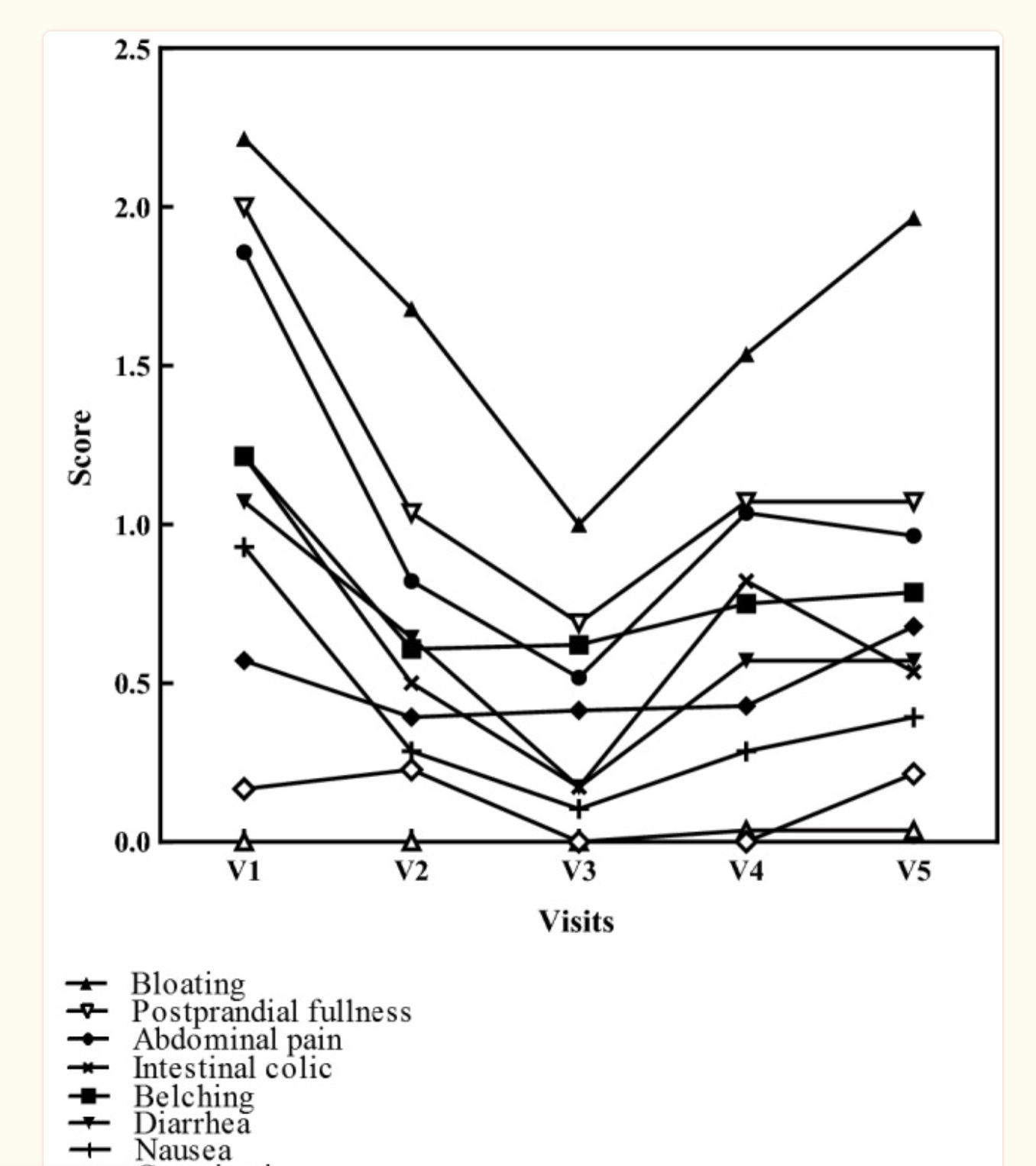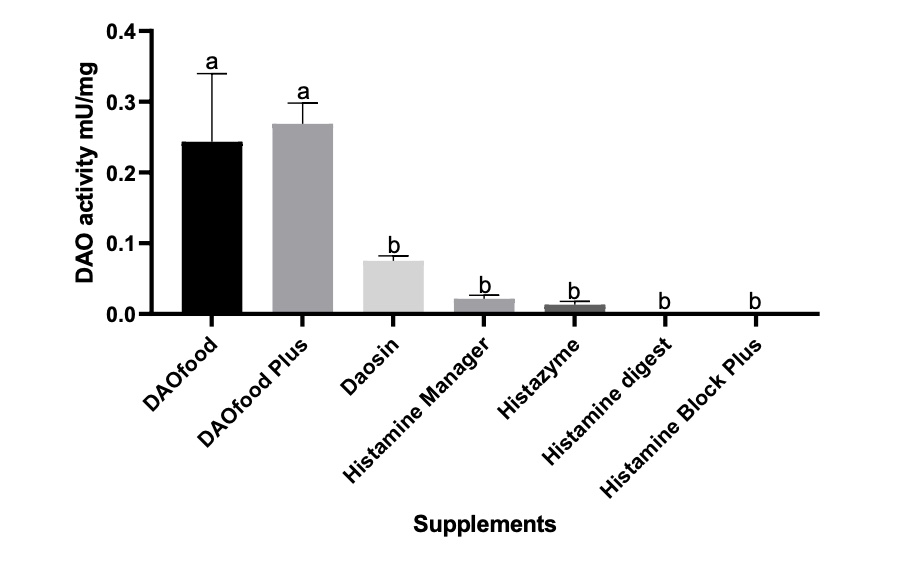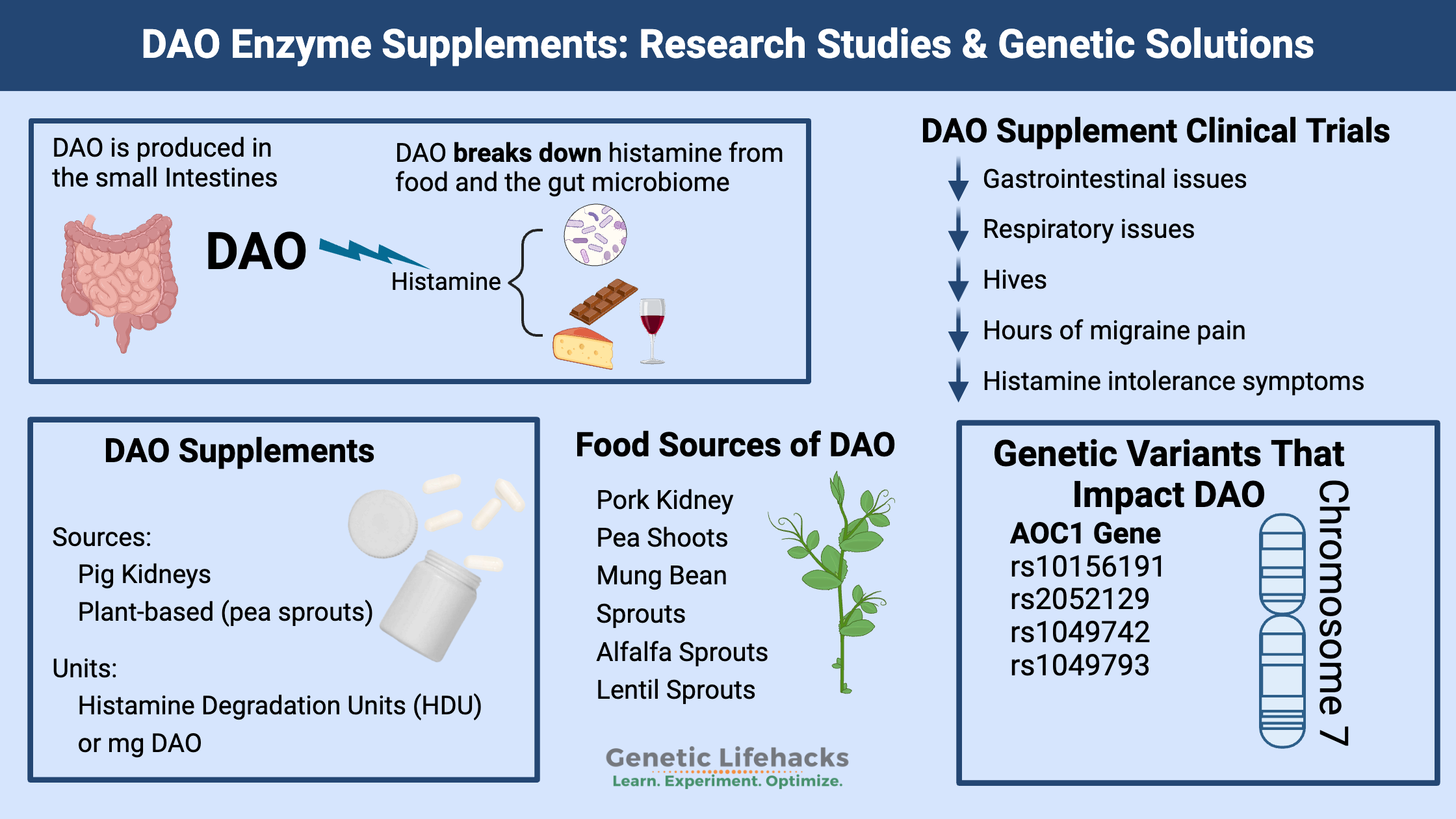Key takeaways:
~ DAO enzyme supplements may help with symptoms of histamine intolerance, gastrointestinal symptoms, respiratory problems, migraines, hives, and IBS.
~ Genetic variants in the AOC1 gene may cause decreased DAO production. Altered gut microbiome composition is another cause of excessive histamine production.
~ Alternatives or additions to DAO supplements include increasing vitamin B6, eating pork kidneys, or eating pea or bean sprouts.
<b>Members</b> will see their genotype report below and the solutions in the Lifehacks section. <a href=”https://www.geneticlifehacks.com/membership/”>Consider joining today</a>.
What does the DAO enzyme do?
Diamine oxidase, or DAO, is an enzyme produced primarily in the gut to break down histamine from food or the gut microbiome.
Histamine is classified as a biogenic amine, which means it contains an amine group with nitrogen at the base. It is a monoamine, which means it has one amine group. Other monoamines include neurotransmitters such as dopamine, norepinephrine, epinephrine, and serotonin.
The vast majority of histamine in the body is stored in and released from mast cells and basophils, which are immune system cells.[ref] Histamine is a powerful signaling molecule and levels are tightly regulated in the body.
Histamine is used by the body in many ways, including:
- As a signaling molecule in the stomach for the release of stomach acid
- Released by mast cells in response to allergens (causes allergy symptoms)
- As a neurotransmitter in the brain
- Released by mast cells in the lung in asthma, causes bronchial constriction
- As a signaling molecule involved in the heart involved in heart rhythm
The small amounts of histamine obtained from foods or from the gut microbiome are usually broken down in the intestines by diamine oxidase (DAO). However, when there is damage in the intestines or genetic impairment of DAO, the histamine from foods can be enough to trigger systemic reactions. For example, levels as low as a few nanograms per milliliter can cause change in heart rate, and at 10 ng/ml can be life-threatening.[ref]
Foods that are particularly high in histamine include
- red wine
- aged cheeses
- chocolate
- sauerkraut, fermented foods
- processed meats, aged meats (sausage, pepperoni, jerky)
- fish or shellfish that isn’t freshly caught
- Tomatoes, avocados, spinach
Symptoms of high levels of histamine, whether from food or other sources, include gastrointestinal distress, migraines, sinus drainage, throat clearing, itching/hives, and heartburn.[ref] In addition, histamine is used as a neurotransmitter causing wakefulness (this is why Benadryl makes you sleepy). A recent study showed that people with DAO deficiency are at an increased risk of insomnia.[ref]
For all the details on histamine reactions, read the full article on histamine intolerance here.
In addition to histamine, the DAO enzyme also breaks down other biogenic amines, including spermidine and putrescine. DAO is produced in the intestines, kidneys, and the placenta. In the placenta during pregnancy, DAO production helps to maintain the pregnancy by preventing high histamine levels which can cause uterine contractions.[ref]
Histamine can also be synthesized by the gut microbiome. A recent study showed that patients with histamine intolerance had altered microbial composition compared to a healthy control group. The histamine intolerance patients had a higher abundance of bacteria that produced histamine.[ref]
Clinical trials and studies with DAO supplements:
DAO is readily available as a supplement, and a number of studies and clinical trials have investigated whether it is helpful for a variety of histamine symptoms.
Gastrointestinal and respiratory symptoms:
A small clinical trial examined the effect of DAO supplements in people with low serum DAO and nonspecific, recurrent gastrointestinal problems while on a low histamine diet. The study participants took 4.2 mg of extracted porcine kidney protein containing 0.3 mg of DAO before meals for one month. Results showed a significant reduction in gastrointestinal symptoms such as reduced bloating, diarrhea, constipation, nausea, abdominal pain and bloating. There was also a reduction in heart palpitations, headaches, nasal congestion, sinus drainage, and asthma symptoms. After stopping the DAO supplements for four weeks, the respiratory and gastrointestinal symptoms returned to some extent.[ref]
Here’s a graph from the study. It shows the decrease in gastrointestinal symptoms from visit 1 (baseline) to visit 3 (four weeks on DAO) and the subsequent increase from visit 3 to visit 5 (four weeks without DAO).

Migraines:
A placebo-controlled, double-blind study of DAO supplements for migraine found that there was a significant reduction in hours of pain. In the study, DAO enzyme supplements were taken with meals for one month.[ref]
Hives (urticaria):
In people with chronic urticaria, DAO supplementation reduced hives, but only in a subset of participants who had low serum DAO levels at baseline. [ref]
Histamine intolerance:
A pilot study using DAO capsules before meals showed that all histamine intolerance symptoms were significantly reduced after four weeks.[ref]
Gut motility:
In a mouse model of irritable bowel syndrome (IBS), DAO supplements derived from pea shoots were shown to reduce the overactive intestinal motility associated with high histamine levels. The study also showed that rectally administered DAO was also effective.[ref]
Fibromyalgia:
Supplemental DAO qualitatively improved symptoms for women with fibromyalgia in a placebo-controlled trial. The study included 100 women who were all being treated for fibromyalgia, and half of the participants took DAO supplements 3x per day. The results showed more improvement in symptoms in the group taking the active DAO supplement compared to the placebo group.[ref]
DAO supplements:
Supplementing with diamine oxidase can help to break down histamine in the gut — from food or produced by the gut microbiome.
The dosage of supplemental DAO is defined in “histamine degrading units” or HDU.
DAO can be derived from pig kidneys or from specific sprouted seeds, such as pea or legume sprouts.
Pork kidney extract sources:
The Seeking Health brand offers Histamine Digest with 30,000 HDUs or 4.2 mg of DAO from pig kidney extract.[ref] Omne Diem brand offers Histamine Digest with 4.2 mg of DAO and 30,000 HDUs.[ref] Amy Meyers brand offers Histazyme with 4.2 mg of DAO and 20,000 HDUs.[ref] DR Health Care offers DAOfood with 4.2 mg of DAO. [ref]
Plant-based sources:
Naturdao is a vegetal DAO supplement from legumes that claims 1,000,000 HDU per tablet.
There are other histamine-related products on the market, including the ones by Designs for Health and Ortho Molecular that don’t contain DAO. Read the labels if you are looking for a DAO supplement.
Quality testing of supplements:
A pre-print study (not peer-reviewed) looked at the histamine-degrading ability of several brands of DAO supplements. There was quite a difference in histamine degradation between different brands of supplements.[ref] Note that the authors were employees of DR Health Care which makes the DAOfood supplements.

Without non-biased, third-party testing, the efficacy of different brands is still questionable. I would suggest reading reviews on Amazon from verified users when choosing a DAO supplement. This can be helpful even if you buy your supplements from the manufacturer or from a local store.
A systemic effect of DAO?
The DAO enzyme is produced in high levels in the intestines as well as in the placenta during pregnancy. In addition, DAO also circulates at low levels through the body and is measurable via blood tests. One proposed definition of histamine intolerance includes having a serum DAO level of <10 U/mL.[ref][ref]
I wanted to point out that several of the clinical trials showed that supplemental DAO taken with meals increased serum DAO levels a little. In addition, the clinical trials show systemic changes in histamine-related symptoms, such as reduced respiratory symptoms, showing a systemic effect. However, the changes are small, and more research is needed here. [ref][ref][ref][ref]
Alternatives to DAO supplements:
Pork kidneys contain quite a bit of DAO enzyme, and butcher shops or large grocery stores often carry them. Pork kidney pie is traditional in the UK, and deviled kidneys are another traditional recipe.
Pea shoots and lentil sprouts contain the DAO enzyme. Pea shoots, or pea sprouts, are the first few inches of the pea plant that come up when you plant the seeds. They taste just like fresh peas and are great in a salad or even a smoothie. Raw lentils from the grocery store sprout fairly easily if the seeds haven’t been heat-treated. Both peas and lentils will contain more DAO if grown in the dark, so cover your sprouting tray/jar or put it in a dark place.[ref]
Mung bean sprouts contain 185 mU/mg protein.[ref]
Of note: Mung bean sprouts or other legume sprouts are traditionally used in Chinese and other Asian cultures. The DAO in these sprouts likely counteracts the high histamine levels in the fermented soy sauce and fish sauce.
Pulses, which include alfalfa, broad bean, common bean, lentils, and white lupin, contain DAO enzyme when raw.[ref] Alfalfa is also easy to sprout, and the sprouts are great on a salad or in stir fry.
Cofactors for DAO:
The DAO enzyme uses pyridoxal 5′-phosphate (P5P), the active form of vitamin B6, as a cofactor. If you don’t get enough B6 in your diet, supplementation with pyridoxal 5′-phosphate or pyridoxine (B6) may help improve DAO activity in breaking down histamine.[ref]
Related article: Vitamin B6 Genes
The DAO enzyme itself contains a copper atom.[ref] While uncommon, a copper deficiency could decrease DAO production. A study of copper supplementation for 6 weeks showed an increase in diamine oxidase levels.[ref]
Gut microbiome:
Some gut bacteria (and probiotic strains) produce histamine in the gut. One study showed that people with histamine intolerance “had a significantly higher abundance of histamine-secreting bacteria, including the genera Staphylococcus and Proteus, several unidentified genera belonging to the family Enterobacteriaceae and the species Clostridium perfringens and Enterococcus faecalis.” [ref]
Another small study showed that DAO supplements at each meal (low histamine diet) helped to reduce certain genera of histamine-secreting bacteria after 9 months.[ref]
Another study showed that people with histamine intolerance have lower levels of Bifidobacteria.[ref] While I can’t find a specific study showing that bifidobacteria probiotics help with histamine intolerance, anecdotal evidence suggests that they do.
Drug interactions with DAO:
Histamine acts as a neurotransmitter in the brain and is implicated in ADHD symptoms in some people. One study looked at whether methylphenidate or lisdexamfetamine interacted with DAO production and found that neither ADHD drug affected DAO. However, lisdexamfetamine was shown to significantly upregulate DAO expression in intestinal cells.[ref]
NSAIDs, such as ibuprofen, acetylsalicylic acid, and paracetamol, have been tested and neither decreased nor increased DAO levels. The study concluded that combining NSAIDs or migraine medications with DAO supplements may be beneficial.[ref]
Nafomastat is a serine protease inhibitor used for pancreatitis and some types of cancer. It was also trialed for covid and other viral infections. A recent study showed that it inhibits the DAO enzyme, which is likely why some people end up with anaphylactic reactions from it.[ref]
Genetic connections: AOC1 gene
The DAO enzyme is encoded by the AOC1 gene. Genetic variants in AOC1 can decrease the production of the DAO enzyme.
Related Articles and Topics:

